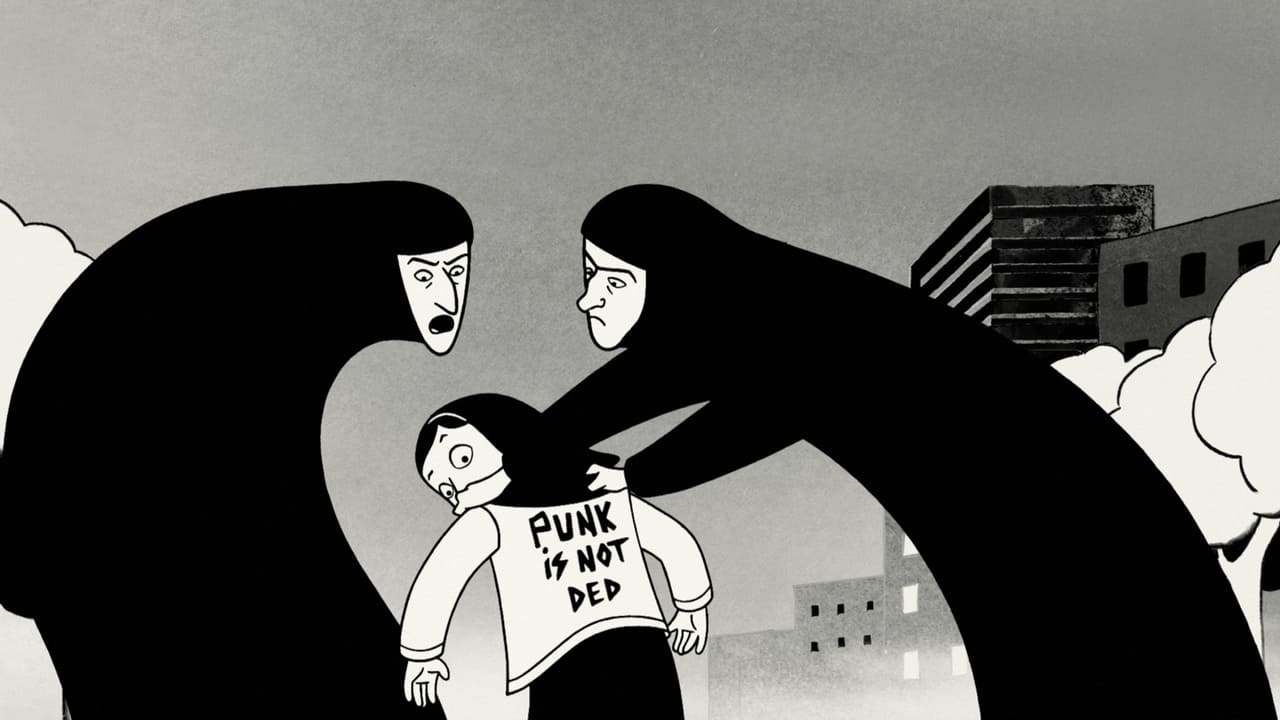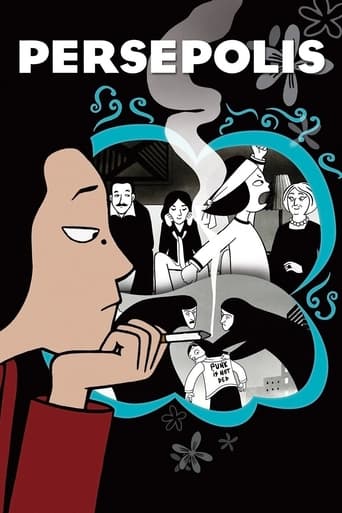

This movie was so-so. It had it's moments, but wasn't the greatest.
... View MoreA film with more than the usual spoiler issues. Talking about it in any detail feels akin to handing you a gift-wrapped present and saying, "I hope you like it -- It's a thriller about a diabolical secret experiment."
... View MoreA great movie, one of the best of this year. There was a bit of confusion at one point in the plot, but nothing serious.
... View MoreStory: It's very simple but honestly that is fine.
... View MoreGrowing up amid wars and repression in 1970s and 1980s Iran proves challenging for a free-spirited girl in this animated drama based on the real life experiences of co-director Marjane Satrapi. Mostly filmed in stark black and white with accentuated shadows and elongated, eerie silhouettes, 'Persepolis' is not your average animated film in the best possible way. Aside from looking great, the animation process allows the filmmakers to do more than what live action can do, providing especially wide eyes for Marjane as a child, incorporating fantasy sequences (imagining herself hung up by her ears), including dream sequences and dreamy bits like Marjane literally hopping from building to building to depict all the places that she moved to at one point in her life. There is also a nifty scene set to 'Eye of the Tiger'. Marjane's experiences as a child are, however, far more interesting than her bouncing between unhappy relationships as an adult, with this being one of those movies in which the second half is less magical than the first half. In a way this is appropriate for a film about a girl waking up to the harsh realities of her patriarchal society, but it is the scenes of young Marjane pretending to be Bruce Lee and believing everything is possible as a child, as opposed to the scenes of her arguing for equal rights at university, that linger in the mind long afterwards.
... View MorePersepolis (2007): Dir: Marjane Satrapi / Voices: Chiara Mastroianni, Catherine Deneuve, Simon Abkarian, Danielle Darrieux, Francois Jerosme: Unique animated film that isn't for families but for those scholars of animation, they will definitely find much to appreciate with its different approach to the genre. It deals with serious issues regarding persecution and family as well as the harsh condition for which these people endured. It chronicles the life of a young Muslim girl whose wild imagination often verges trouble. She lives through the Iran / Iraq war but is spirited away at the urge of her family where she grows weary of a school in Vienna. Director Marjane Satrapi delivers an original animated style that is backed with themes of economic distress. Characters and the world they inhabit are mostly black and white, which endorses the particular style and mood of the film. The voice talents include Chiara Mastroianni who lights up the lead and her open imagination during the war and destruction of society. Catherine Deneuve, and Simon Abkarian voice her parents while Danielle Darrieux voices her grandmother. Francois Jerosme voices an uncle. One thing that becomes clear is that a good imagination comes in handy during times of extreme duress, and this film demonstrate that quality effectively. The film voices its message through its unique animated style. Score: 9 / 10
... View MoreWhile animation is an art form primarily associated with children's entertainment, there are more than a few animated films which deal with more mature themes and are geared towards an older audience. PERSEPOLIS is one such film. Co-directed by Marjane Satrapi, who based this on her experiences as a young girl growing up in Iran, it tells a story about the struggle to find one's identity in a rapidly changing world. In Marjane's case, her formative years took place amid the chaotic years of the Islamic Revolution when the US-backed Shah was overthrown by populist revolt and an Islamic Republic established in its place. Even though communist revolutionaries, such as her uncle, were imprisoned under the Shah's rules, the Islamic Republic that replaced it was in some ways even more repressive. As a way of escaping this, Marjane is sent off to a French school in Vienna but she eventually comes back to her family after bad experiences leave her alone and almost destitute. Yet, the Iran she returns to is even more different than the one she grew up in and left before. Ultimately, this is a simultaneously complex and simple look at Iranian life through the eyes of a young woman. It's complex in the sense that Marjane has conflicted feelings about the country of her ancestors, yet simple because it is presented through the eyes of someone who has yet to find themselves. This film is based on a graphic novel, and the mostly black-and-white animation style reproduces this look faithfully while also adding a sense of childlike wonder. It was a simple, yet beautiful, way to tell an important story. I hesitate to say that Marjane's story is representative of all Iranians' experience, yet it is valuable precisely because it is a personal experience. The story of her life growing up is tragic and hopeful, sad and yet still not without humor. This roller-coaster of emotions and unique look at an oft misunderstood culture are the film's strongest selling points, aside from the top-notch animation and score. For viewers looking to expand their horizons a bit, PERSEPOLIS has everything you could possibly want from a great film: action, romance, tragedy, humor, etc. It has it all, and most importantly it provides unique cultural insight. Highly recommended.
... View MoreArtistically, it's great-a graphic novel that is not converted to live-action, but instead stays a series of drawings with enough animation to keep it going without it turning into a silly cartoon. The pace is perfect, too; it neither dawdles or rushes too fast. Also, the characters and settings are just detailed enough to make everyone and everything distinctive. Scenes of violence such as bombing, shootings, and tank advances take care to convey the message without being too gruesome.So how is the movie, story-wise? It is the autobiographical story of a young rebellious girl who is part of an upper-class family in Iran, many of whom are also rebels, not only politically but also socially. Some manage to fly under the radar while others end up imprisoned, tortured, and killed. They rebel against the hated Shah and rejoice in his overthrow, only to find the new Islamist regime far worse. The girl is sent to Austria to live with a relative and go to school in her teens, but the relative has her leave and sends her to a Catholic school, and she and the people around her do not get along very well. She becomes ill and homeless, and returns to Iran-but finds herself no happier there either.The story is credible, but a lot of important information is left out. How did the girl's family become upper-class, and how did it evidently stay that way despite all the social and political turmoil? Why did they stay in Iran despite everything? The film criticizes the West, but completely omits the taking of the US Embassy (in complete violation of international law) and the kidnapping and torture of the embassy staff? I guess the producers of the film hated questions like that.
... View More